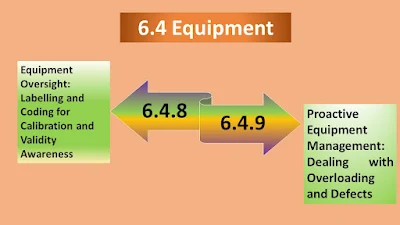Clause 6.4.8 specifies
requirements related to the identification of equipment that requires
calibration or has a defined period of validity. The purpose of this clause is
to ensure that users of the equipment can readily identify the calibration
status or the period during which the equipment is considered valid for use. The
explanation of this clause are as follows:
1. Equipment Requiring Calibration:
This refers to measuring instruments, devices,
or equipment used in the laboratory that need to undergo calibration at
specific intervals to ensure their accuracy and reliability in measurements.
2. Defined Period of Validity:
Equipment have a
predefined period during which they are considered valid for use without
requiring calibration. This could be based on factors such as the stability of
the equipment or the nature of the measurements it performs.
3. Labelling, Coding, or Identification:
This emphasizes the need
to label, code, or otherwise identify the equipment. This identification should
be visible and easily accessible, allowing users to determine the calibration
status or the period of validity without ambiguity.
4. Readily Identify the Status:
The intention is to make it easy for
laboratory personnel to determine whether the equipment is within its valid
calibration period or if it requires calibration. This is essential for
maintaining the quality and reliability of measurements conducted using that
equipment.
5. User Awareness:
Having a clear labelling
or coding system, the laboratory ensures that users are aware of the current
status of the equipment they are using. This is critical for making informed
decisions about the reliability of measurements and whether recalibration is
necessary.
Clause 6.4.9
outlines procedures and requirements for handling equipment that has been
subjected to certain conditions, such as overloading, mishandling, providing
questionable results, or being shown to be defective or outside specified
requirements. The explanation of this clause are as follows:
1. Equipment Condition:
The conditions mentioned
include overloading, mishandling, questionable results, or being defective or
deviating from specified requirements. These conditions can potentially
compromise the accuracy and reliability of the equipment.
2. Action to Be Taken:
When equipment falls into any of the specified
conditions, it must be taken out of service. This means removing it from active
use to prevent any further potential issues or inaccuracies in the results it
produces.
3. Isolation or Labelling:
The equipment should be isolated, preventing
its use by personnel. Alternatively, it should be clearly labelled or marked as
being out of service. This is a visual indication to all laboratory personnel
that the equipment is not to be used until its performance is verified.
4. Verification of Performance:
Before the equipment can
be reintroduced into service, it must undergo a verification process to ensure
that it performs correctly. This verification aims to confirm that the
equipment is functioning within specified requirements and can produce reliable
and accurate results.
5. Examination of the Defect or Deviation:
The laboratory is
required to examine the nature and extent of the defect or deviation from
specified requirements. This examination helps in understanding the potential
impact on the equipment's performance and the validity of past results.
6. Management of Nonconforming Work Procedure:
The laboratory should
initiate a management procedure for dealing with nonconforming work. This
involves documenting the details of the defect, the actions taken, and any
necessary corrective measures to prevent similar issues in the future. It's a
part of quality management to maintain and enhance the reliability of
laboratory processes.

No comments:
Post a Comment